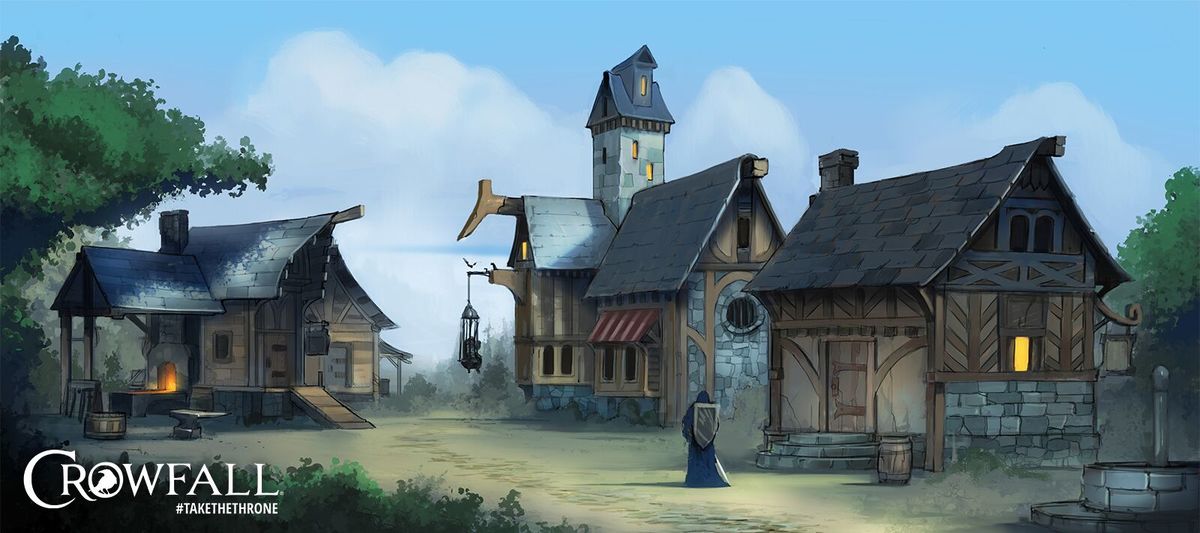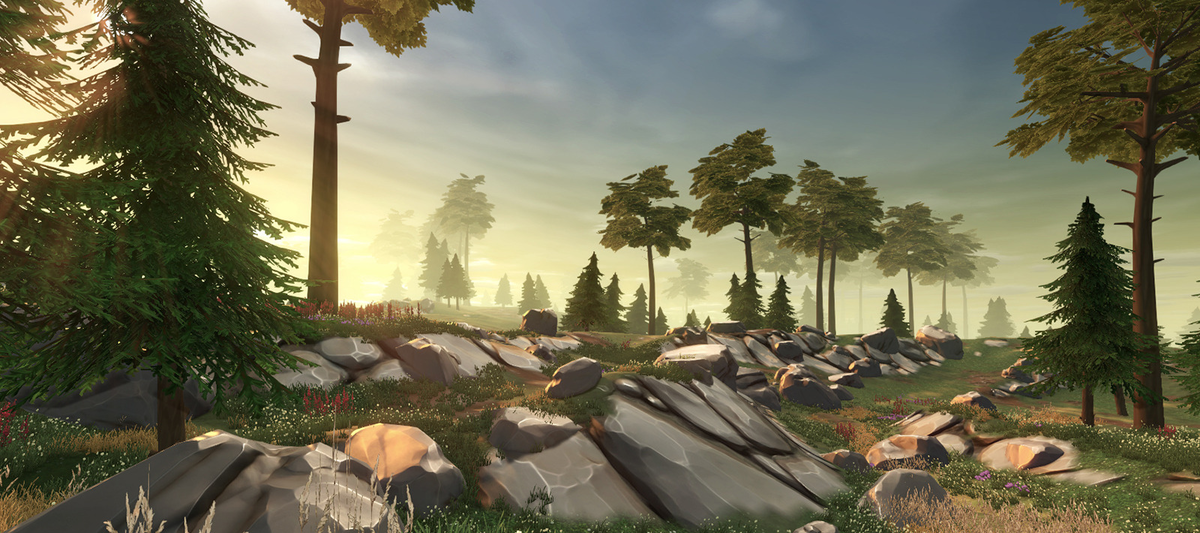Back in May 2018, I sat down for a chat with Crowfall Creative Director, J. Todd Coleman. As always, it was a busy time for the team and this latest catchup with J. Todd is no different. The studio remains hard at work, and most importantly, there's major milestones ahead. A lot has happened between then and now, but our focus this time around was on the War of the Gods, the value of Guild versus Guild, and the Dregs. Here's how we got on.
Ten Ton Hammer: Hey J Todd! We last spoke in May last year (time flies!). How are things going? How are things in the world of Crowfall?
J. Todd: Things are going very well! We’ve just started work on our War of the Gods milestone, which is the last major update that we need to do between now and release.
This is probably the MOST critical milestone for us, because it builds on the foundation that we’ve laid out over the last few years: procedural worlds, dynamic placement of buildings and props, our city & castle sieging system and the incredibly deep character advancement system (we have about 1500 unique powers spread across thousands of unique race/class/sub-class combinations).
All of that is already in and working. Now we just need to add the elements to make Crowfall really unique: city advancement, guild-vs-guild support, and divine favor (i.e. the War of the Gods).

Concept art for the Dregs and its city building functionality.
Ten Ton Hammer: What can players expect from the final milestone? Everyone knows it’ll still be a little rough around the edges, but are all the gameplay loops in, and all classes and races present and correct?
J. Todd: Absolutely, this next release brings in the final class that we’ve been waiting for: the Frostweaver. That means we will have all races and classes (and promotion classes, skill trees, and multi-classing disciplines) present and accounted for. This version also brings in things like mounts and caravans and refineries… a host of other features that are core to the game loop, but not as critical as procedural world generation or the ability to dynamically add, move and destroy buildings.
The good news is that most of our really hard problems are now behind us. Imagine an MMO where every server or realm has a unique map (unique cities and roads, forests and mountains) and that characters can move between them. Where we can pick up a mountain range in the distance and move it, restitching the terrain in real time, without forcing players to disconnect (much less reboot the server).
We already have that working. Now add a strategy game with territory capture and control, dynamic creation of buildings and defenses. Each server (campaign) spans roughly a dozen unique worlds, with players capturing Forts and Keeps and Castles and using raw building materials (stone, timber, ore) to build their defenses and lay siege to their neighbors. We have all that already, too – but, frankly, the game is pretty limited in terms of strategy. Right now, the only strategy is “capture the most locations to win!”
This milestone really builds on that foundation, adding a Divine Favor system where players compete for the favor of the Gods over the course of the 4 seasons: spring, summer, fall and winter. These seasons are structural beats in the campaign where the rules can change and teams will need to re-align goals and tactics (in table top terms, these work like the Ages in a game like 7 Wonders). Each of our gods (there are 12) will offer different goals, so players can choose different objectives to try and win the strategy game beyond just territory capture.

Ten Ton Hammer: In your original Kickstarter pitch, you made reference to 5 Campaigns (Eternal Kingdoms, God’s Reach, The Infected, The Shadow and The Dregs). Are we still on course for all these, and is there a risk of confusing players?
J. Todd: That’s absolutely a risk. Crowfall has a very wide scope in terms of design. I’ve been trying to go back and streamline the world choices, to make sure each one is a unique offering.
We already support:
- the Eternal Kingdoms, are player-created, and player-managed worlds that act as markets, housing zones and social hubs
- God’s Reach is a PvE-only “newbie world” for players to learn the game,
- The Infected is a 3-Faction PvP world in the tradition of Dark Ages or Planetside,
…and, with this final milestone, we’ll add the Dregs, Guild-vs-Guild PvP campaigns.
(I’m still not sure if we’ll want to ship the Shadowlands; we have the tools to support it, but I’m not convinced that there will be enough interest to warrant it. Let’s see how the Dregs testing goes and then ask our players for if they feel like another world type would be popular.)
Ten Ton Hammer: Can you tell me about the Dregs, and specifically for anyone that A) hasn’t been following Crowfall too much, and B) hasn’t heard of your previous title, Shadowbane. What are the Dregs and what does it mean for Crowfall?
J. Todd: Of course!
Most modern PvP-focused MMO games use a 3-Faction system; players join team A, or B, or C and then fight on behalf of the team. Even Pokemon Go falls into this camp.
The Dregs eschews that model in favor of something more like Risk; each guild is a stand-alone team that can capture territory (or not) in a quest to win the Campaign and prove their superiority.
In addition to the Divine Favor system that I mentioned earlier, this version also adds Building Advancement and Stronghold Customization, to force guilds to make tactical decisions about what buildings they want in each city or castle. Do I want a barracks, to get better guards? Or a stable, to increase the speed of my caravans?

Ten Ton Hammer: Guild versus Guild combat is key to most MMO’s, but it’s often not wrapped up in specific rulesets (such as Guild Wars 2, and the fact it didn’t pursue its original design choice from Guild Wars). How are you framing Guild versus Guild combat? Is it structured (such as Guild Wars) or is it looser?
J. Todd: It’s different. You mentioned my first MMO, Shadowbane, earlier – that game was incredibly strong in terms of flexibility and guild support, more than any other MMO since. My goal with Crowfall is to push that even further.
It’s quite a difficult challenge because I want to give players as much control as possible – but, at the same time, not make every campaign come down to just a question of who-has-the-largest-guild.
The Divine Favor system, that I mentioned, is the answer to that problem. This system uses a mechanic common in table-top strategy games, like the special cards in Catan that give you points for having “the Longest Road” or “the Largest Army”.
We divided these cards into three sets: Glory, Wealth and Power. Glory strategies are about doing things to please the Gods; Wealth strategies are about building & creation; Power strategies are variations on the siege & capture mechanics that we already have in place.
We randomized these goals, so that every Campaign is different, and we tried to provide a nice mix of options so that we provide strategic alternatives for smaller and larger teams, and for guilds that are better at, say, building things than they are in a direct PvP confrontation.
In terms of strategy and replayability, the Divine Favor system is going to make Crowfall incredibly unique and innovative. There isn’t another MMO like it.
Ten Ton Hammer: How is the studio going to adapt to the number of campaigns in Crowfall, if you find that activity plummets in one, and spikes in another? Are you willing to cut some loose, even if they were in the original Kickstarter?
J. Todd: Part of the philosophy of Crowfall was to make it a massive platform for experimentation. We set up the things that we want to change in a world as configuration variables, such as:
- PvP on / off?
- Faction or Guild based teams?
- How harsh are the loot rules?
- How big are the procedurally generated worlds?
- How rich is this world in quality and quantity of resources?
- When a player joins this world, what item(s) can they bring in and take out?
With the idea being that, since there isn’t a game like this that we can use as a model, we should recognize that we’re not always going to “get it right” … So, let’s embrace that idea, build an architecture that is built for constant experimentation. We can work with our players to try out interesting ideas, riff on the ones that work and dump the onesthat don’t. Eventually we will find the combinations that result in the most fun and compelling campaigns.

Even at this point of development, Crowfall is gorgeous.
Ten Ton Hammer: Lastly, and this is perhaps as long as a piece of string, but what’s your "Alpha" time-frame? Are we talking 12 months? Longer? And if there’s no set date until you reach Beta, what should players be anticipating as you progress through development (besides the usual polish).
I don’t like to use terms like ‘pre-alpha’ or ‘alpha’ externally, to be honest, because these were originally production terms that denoted phases of internal development – but now they’ve been largely co-opted, the idea of what constitutes an ‘alpha’ varies so widely from one game to the next as to make the term practically meaningless.
I suppose that with this release we’ll officially call it Alpha internally, but I’d rather not make a big deal of that externally because I don’t think anyone really cares what we call it. We’ll be working on this milestone through the end of the year and launch it in early 2020. The most important thing is: this is the last major update that we’ll do before we move our entire team onto bug fixing and polish.
And once we’re done with that, we’ll launch.
Ten Ton Hammer would like to thanks J. Todd Coleman for taking the time out of his very busy schedule to talk all things Crowfall.
To read the latest guides, news, and features you can visit our Crowfall Game Page.




